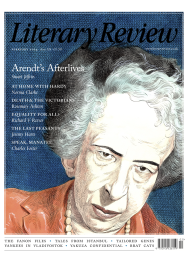Ian Critchley
Splendid Isolation
Fourteen Days: A Collaborative Novel
By Edited by Margaret Atwood & Douglas Preston
Chatto & Windus 380pp £20
Collaborative writing has a long history. For Renaissance playwrights it was accepted practice, part of their work with the theatrical companies they were attached to. More recently the Italian collective Luther Blissett produced a bestseller with the historical novel Q (1999), while their sister group, Wu Ming, consisting of five writers, wrote a series of novels in the 2000s. Books written by pairs are common, a notable recent success being Good Omens, cowritten by Terry Pratchett and Neil Gaiman. Fourteen Days, however, is a collaboration on a much larger scale. Thirty-six American and Canadian writers have contributed to the novel, including Dave Eggers, Margaret Atwood, John Grisham and Celeste Ng, with proceeds from sales going to the Authors Guild Foundation.
It sounds complicated but the novel works brilliantly, partly because of the simplicity of its premise. It is March 2020 and lockdown in New York is in full force. Every evening the denizens of a decaying tenement block on the Lower East Side gather on the roof to clap and bang saucepans in support of the city’s key workers. Then, to pass the time, they tell each other stories. Every contributor takes on the mantle of one of the apartment block’s inhabitants, though it’s only made clear in the biographical notes at the end of the book who has written which tale. The building’s superintendent narrates the novel’s framing story, observing each of the characters and identifying them by the nicknames she has given them: among them are Vinegar, Florida, the Lady with the Rings and Eurovision, who is deeply annoyed that the 2020 song contest has been cancelled.
As might be expected from such a large and diverse set of writers, the stories vary wildly in subject matter and roam widely around the world, from the Dominican Republic and Mexico to China and Afghanistan. One story heads back in time to 16th-century London, where Shakespeare is a struggling

Sign Up to our newsletter
Receive free articles, highlights from the archive, news, details of prizes, and much more.@Lit_Review
Follow Literary Review on Twitter
Twitter Feed
‘The Second World War was won in Oxford. Discuss.’
@RankinNick gives the question his best shot.
Nicholas Rankin - We Shall Fight in the Buttery
Nicholas Rankin: We Shall Fight in the Buttery - Oxford’s War 1939–1945 by Ashley Jackson
literaryreview.co.uk
For the first time, all of Sylvia Plath’s surviving prose, a massive body of stories, articles, reviews and letters, has been gathered together in a single volume.
@FionaRSampson sifts it for evidence of how the young Sylvia became Sylvia Plath.
Fiona Sampson - Changed in a Minute
Fiona Sampson: Changed in a Minute - The Collected Prose of Sylvia Plath by Peter K Steinberg (ed)
literaryreview.co.uk
The ruling class has lost its sprezzatura.
On porky rolodexes and the persistence of elite reproduction, for the @Lit_Review: